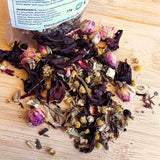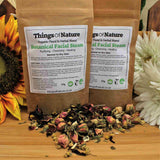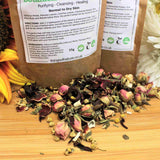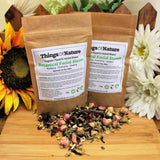This plant, rich in antioxidants and flavonoids, was used as far back as ancient Greece to treat dry skin, amongst many other conditions. It has even earned the name 'plant's physician' for its apparent ability to heal plants it grows alongside, although bees do not seem fond of it's scent and flowers.
Although mostly studied in animals, many dermatologists are now saying there is good reason to assume this plant is living up to its reputation. It has been reported to have a soothing and healing effect as a result of its antioxidant and anti-inflammatory properties. We certainly feel this plant is worth including in your skincare regime.
This is a plant that many people have heard of, perhaps by any of its traditional names like 'knitbone', and has a reputation for needing caution. Because it can harm your liver, it is a plant that should not be used internally. However, the safety and usefulness of chickweed hold well when it's used topically.
With it's compounds allantoin, boosting new skin cell production, and rosmarinic acid, an anti-inflammatory that could relieve pain, it could be an aide in healing dry skin, helping the skin's own natural healing abilities.
Scientific evidence does suggest it has the ability to relieve pain, and can be used on closed wounds to speed up healing. Some research suggests it's an aide for treating osteoarthritis, injuries such as ankle sprain and even lower or upper back pain. Just remember, this is a potent plant that needs a common sense approach and is best to avoid when pregnant.
The large, colourful flowers of this beauty are a well known staple for gardeners. It is used in many herbal tea remedies and has some wonderful benefits for topical use and hair treatments. The pulp from the tea has been used to apply to the skin for healing wounds and fighting bacterial infections.
For skincare, this plant's mucilage can help lock moisture into the skin. This can help reduce wrinkles. In hair treatments it's been used for hair loss and dandruff treatments, adding lustre, thickening hair and conditioning dry, brittle hair.
The studies on this flower have mostly been done in animals and do show positive effects, however, little research has been done for human applications.
The roots of this perennial, native to Europe, Northern Africa and Western Asia, has thousands of years of use in natural remedies for skin and other conditions. Skin irritation from conditions as furunculosis, dermatitis and eczema can feel the soothing effects of this root's anti-inflammatory workings.
There is also an antibacterial effect that could be beneficial in the healing of wounds, as laboratory studies suggest. Studies have also been done into the potential for improving skin that is affected by eczema or UV exposure. This function needs further research to understand the mechanism, however the results support its usefulness.
We've all seen this plant, which is generally considered a garden pest, but most won't know its name. This is really a shame, as it has centuries of use in folk remedies for treating inflammation and healing wounds.
In studies, it has shown to have anti-inflammatory qualities, as well as pain relieving properties and the ability to block the growth of microbes.
As an all-rounder for repairing the body, both internally and externally, it could be really beneficial for dry and flaky skins. Persistent dry skin is often a sign of damage from environmental factors, and plantain could be a support to your skin's own repair mechanism. Oh, and plantain is an edible plant too, so mind you, next time you're weeding your patch, pick a few leaves for your salad!
The beautiful flower we all love has a bunch of extra beneficial qualities that can do wonders for the skin. Although there are further benefits, here we focus on those provided by rose water, which are the benefits received when adding these rose buds to a botanical steam.
By inhibiting certain enzymes that can have harmful effects, rose water can help to protect against cell damage and soothe irritation. For dry skins this could be a blessing, helping the skin to balance itself. There is a further benefit from the scent, which studies show has a calming and relaxing effect.








